Traveling with a guitar can pose several challenges due to its size and fragility. This is where travel guitars come in. With their compact size and portability, they become essential companions for musicians on the go. These instruments are designed to withstand the rigors of the road while still delivering quality sound. Whether for campfire sing-alongs, impromptu jam sessions, or maintaining practice routines while away from home, travel guitars ensure that music is always at hand.
When picking a travel guitar, there are several factors to consider to find the perfect match for your needs. Size and portability are obvious concerns; a good travel guitar must fit in overhead compartments or be comfortable to carry for extended periods. Sound quality, however, should not be sacrificed for size. Many travel guitars now offer innovative designs that produce voluminous tones rivaling their full-sized counterparts. Durability is also key – materials and construction need to handle the occasional bump or knock.
Beyond physical attributes, playability is crucial. A travel guitar’s neck should feel comfortable in your hand, and the action – the distance between the strings and the fretboard – should be low enough to play easily but high enough to avoid buzzing. Additional features like built-in pickups for amplification and removable necks for even more compact storage can enhance the travel guitar experience.
We’ve dedicated hours to evaluating various travel guitars to identify the best blend of portability, playability, and rich sound. Whether you’re a professional musician or a hobbyist, the right travel guitar can be a reliable and inspiring musical partner.
Top Travel Guitars
We’ve scoured the market to curate a list of top travel guitars that offer a perfect balance of portability, playability, and rich sound. Whether you’re an avid musician on the go or just seeking a compact companion for your musical journeys, our selection is tailored to meet a diverse range of needs and preferences. With attention to craftsmanship, tone, and overall value, our recommended picks will enhance your playing experience wherever your travels take you.
Donner HUSH-I Travel Guitar
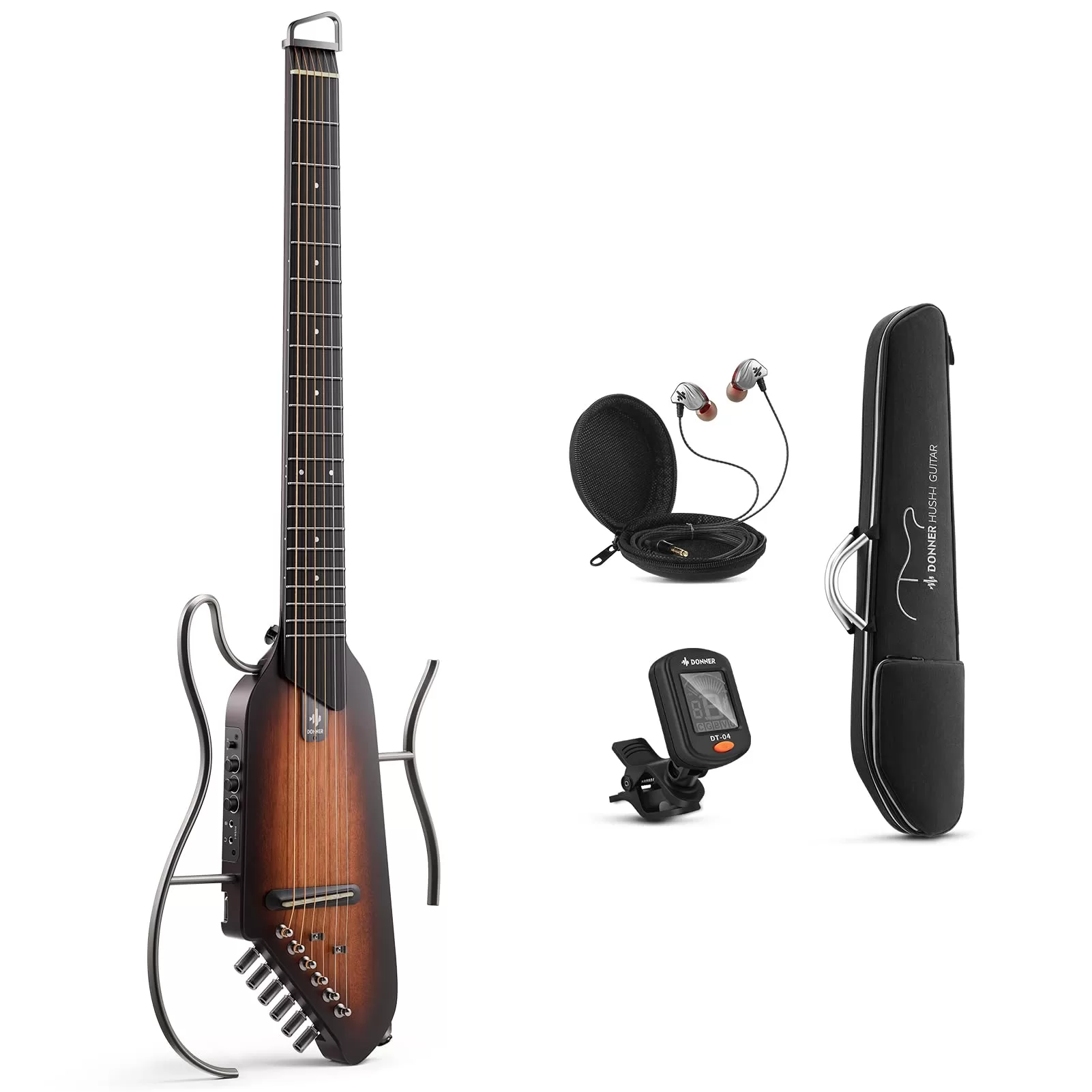
For musicians on the move, the Donner HUSH-I offers a harmonious blend of portability and enjoyable playability that’s hard to resist.
Pros
- Compact and travel-friendly design
- Ultra-quiet functionality for discreet practice
- Comfortable neck shape and beginner-friendly frets
Cons
- Tuners might take some getting used to
- Limited acoustic performance when unplugged
- Some players may not prefer the headless design
Strapping the Donner HUSH-I on, the first thing we notice is its portability. It’s slim, nearly the weight of a laptop, and slides effortlessly into its gig bag. We’re boarding flights hassle-free, thanks to their overhead bin-friendly size, and setting up for impromptu sessions in no time.
The peacefulness of practice sessions with this guitar is a notable highlight. Strumming silently at -30-45dB avoids disturbing others, perfect for late-night creativity surges in our apartment. Plugging in headphones, the preamp system delivers a surprisingly rich acoustic tone that encourages us to lose ourselves in the music.
Comfort is a game-changer, and the asymmetric neck of the HUSH-I does wonders for our hands. Long hours breeze by, and our wrists thank us. The customized round frets, a subtle but appreciated touch, ensure our fingers are spared any unnecessary strain.
While the HUSH-I excels in its specific niche for quiet, travel-friendly practice, it’s important to remember that it isn’t a traditional acoustic-electric. Therefore, we might need to look elsewhere if we’re after the authentic raw acoustic sound. In summary, when we need a reliable travel companion to practice without making a peep, the Donner HUSH-I unquestionably strikes a chord with us.
Martin Backpacker Guitar
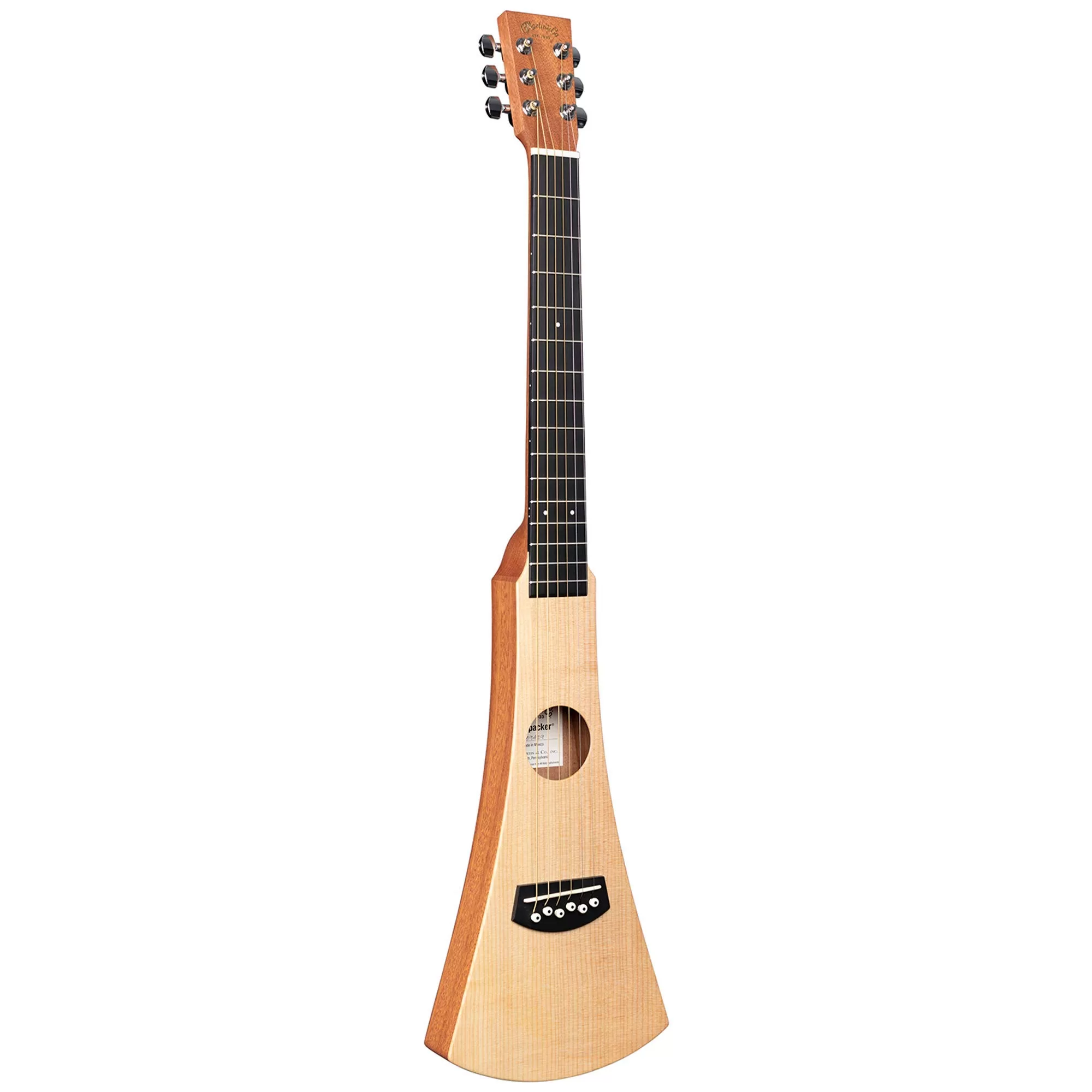
We think you’ll be satisfied with the Martin Backpacker Guitar – it blends portability with the renowned Martin tone, perfect for musicians on the move.
Pros
- Exceptional portability for travel
- Solid tonewood enhances durability
- Stays in tune after long travel days
Cons
- The sound may lack the depth of larger guitars
- Unconventional shapes might feel awkward initially
- Limited fretboard space for complex fingerwork
After strumming on the Martin Backpacker Guitar, its utility as a travel instrument was straightforward. This guitar slips into compact spaces with ease, a remarkable feat considering its solid build. Its unique contours are a talking point and contribute to its lightness – a breeze to carry around.
The craftsmanship of the Martin Backpacker Guitar immediately stands out. Playing it feels different, yet familiar. The surprisingly rich sound quality belies its slim profile. It might not match the full-bodied resonance of a dreadnought, but it’s loud enough to gather a crowd around a bonfire.
Our long-term experience with this guitar has reinforced its reliability. Tuning is straightforward, and once set, it holds pitch admirably across various climates. For musicians wanting to maintain practice or share tunes while on adventures, this Martin is an astute choice. Some may find the narrow neck and fewer frets challenging, but with a little adaptation, its playability is unquestionable.
Enya Nova Go
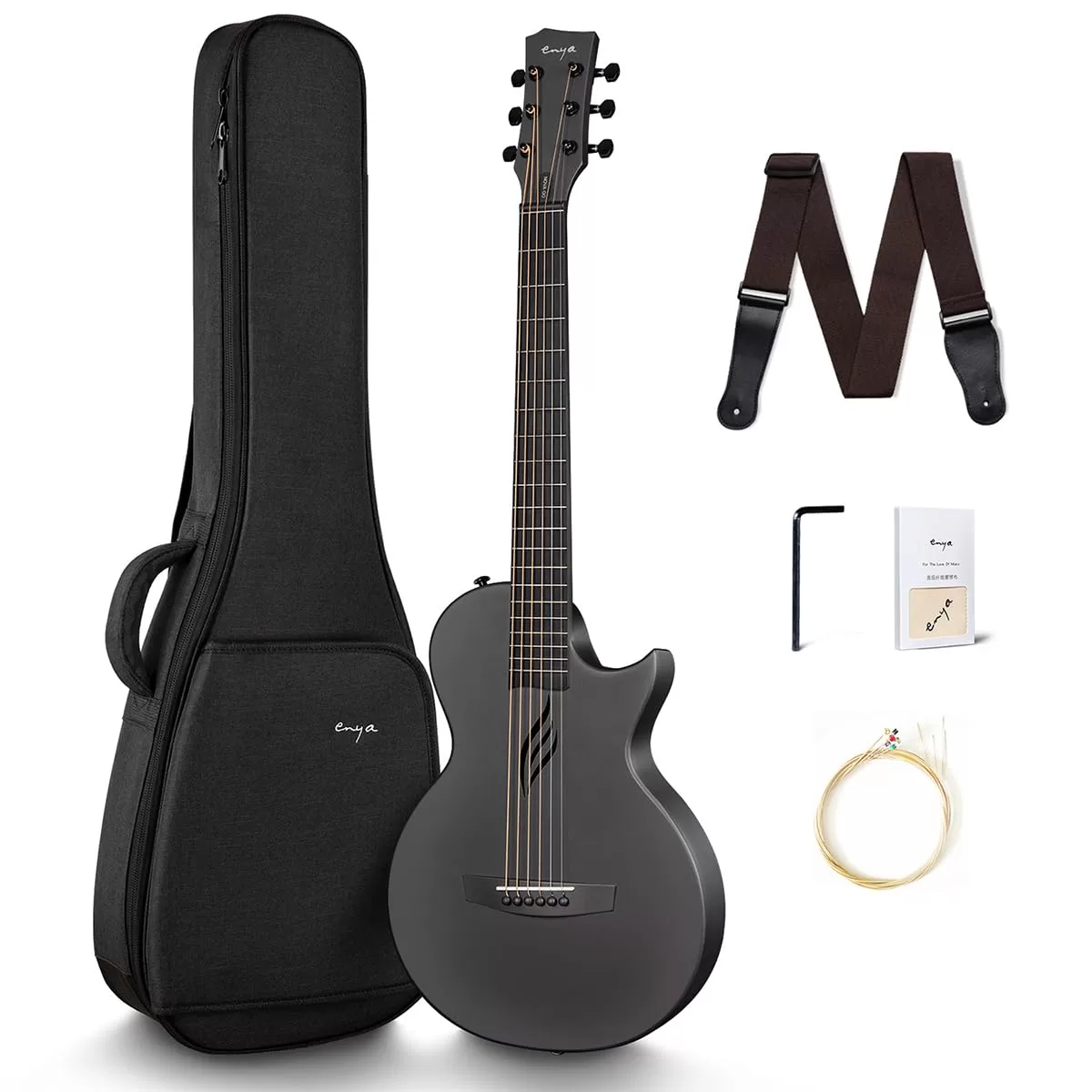
If you’re in the market for a robust and traveler-friendly guitar, the Enya Nova Go is a reliable companion for your musical journey.
Pros
- Resistant to humidity and temperature changes
- Solid one-piece construction and ease of play
- Includes practical accessories like a gig bag
Cons
- It may feel different from traditional wooden guitars
- smaller size might not suit all playing styles
- Sound projection may not match larger guitars
Having just strummed the Enya Nova Go, its resilience against nature’s elements is immediately noteworthy. The carbon fiber build means it doesn’t flinch in the face of scorching sun or freezing cold, an undoubtedly reassuring feature for outdoor play. Our chords felt stable, the strings were responsive, and this pleasing lightness made playing for hours effortless.
The one-piece construction stood out as we explored the Nova Go’s features. Typical concerns over bridge durability fade away since it’s part and parcel of the guitar top. And should you wish to tweak string action, the included truss rod has got you covered right out of the gate. Adjustments are a breeze, ensuring the guitar is comfortable for various hand sizes.
Finally, the thoughtful addition of accessories speaks to the practical needs of musicians. Carrying it around in the complementary gig bag felt secure, and it’s easy to see this guitar being a splendid gift, owing to the colorful and considerate packaging. The Enya Nova Go feels like a tool built with the pragmatic side of music-making in mind.
Traveler Ultra-Light
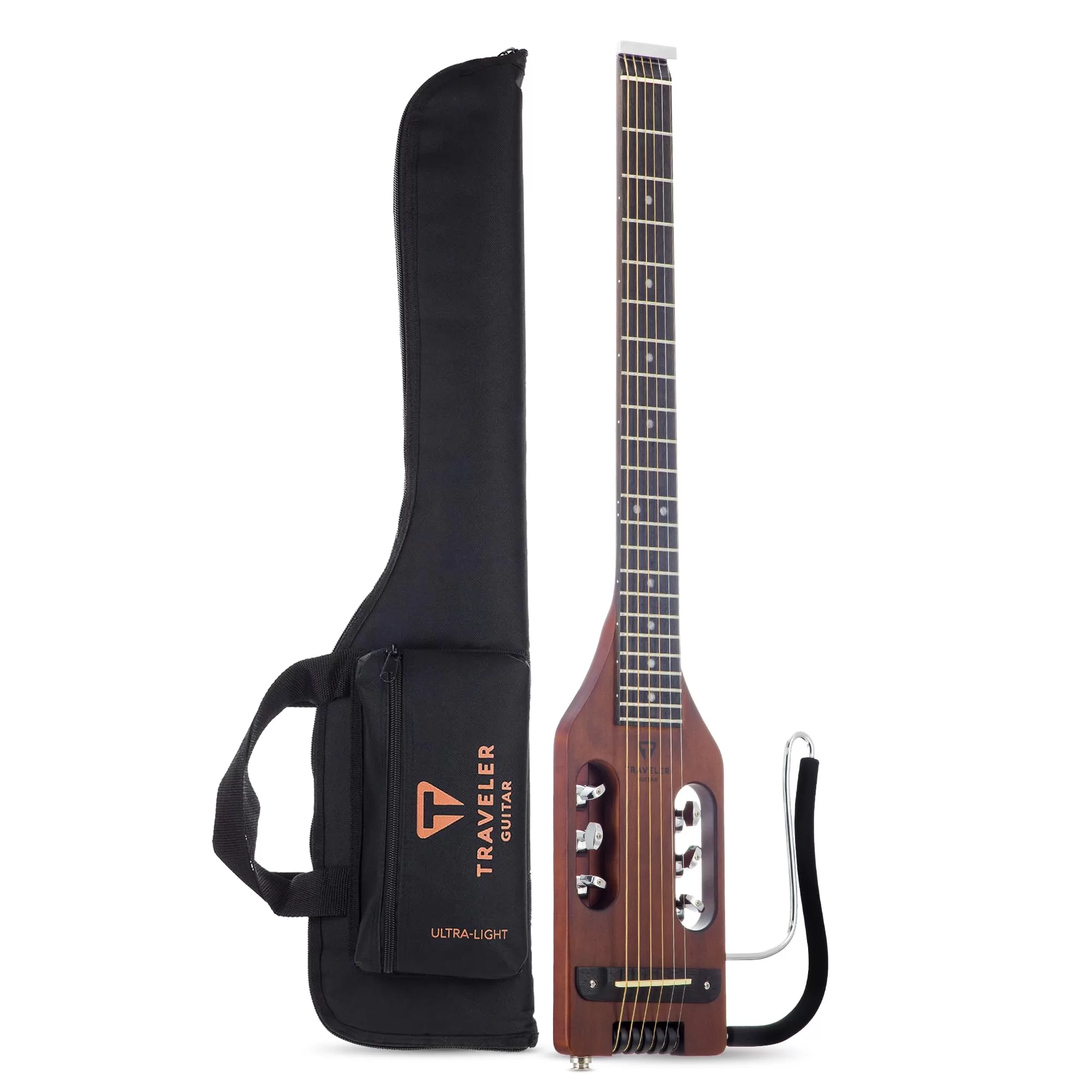
We think the Traveler Ultra-Light is a stellar choice for musicians on the move, providing a full-scale playing experience in a compact form.
Pros
- Remarkably lightweight and compact
- Full-scale neck preserves familiar playing feel
- Detachable lap rest enhances portability
Cons
- Unconventional look may not appeal to all
- Limited acoustic volume without amplification
- Some may find the in-body tuning system awkward at first
Having experienced the portability of the Traveler Ultra-Light firsthand, we can attest to its convenience and functionality. Its incredibly light form factor makes it a joy to carry through airports and cities. Stowing this guitar in a crowded plane cabin is a breeze – it fits snugly in overhead compartments without the fear of damage.
The performance offered by this travel guitar is impressively uncompromised. Despite its small stature, it feels like you’re playing a full-sized guitar with a standard scale length and a neck that allows for deft finger movements and chords. It’s refreshing to see this level of detail in a guitar designed for travel.
The Traveler Ultra-Light’s simplicity is its charm. There’s no need for bulky cases or extra gear – just grab the included gig bag, and you’re ready to go. While the piezo pickup delivers electronic sound to your preferred amplifier, keep in mind that the acoustic sound is less robust due to the body size. However, plugging in brings your music back to life with surprising clarity.
Traveler Ultra-Light Electric
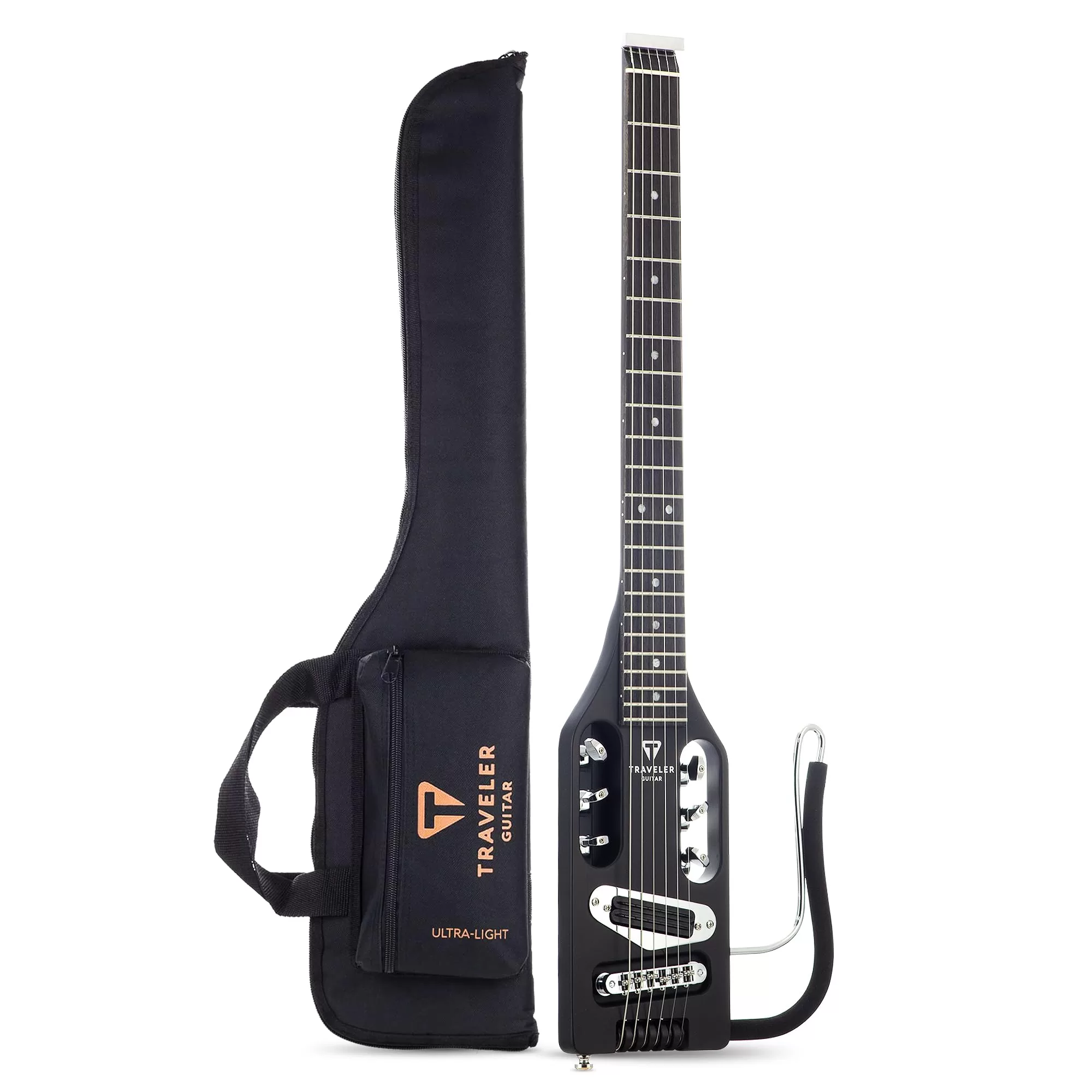
If you’re a musician on the move, the Traveler Ultra-Light Electric will impress you with its portability. It doesn’t sacrifice the full-scale playing experience.
Pros
- Incredibly lightweight and travel-friendly
- Full-scale neck provides familiar playing experience
- Detachable lap rest for convenient packing
Cons
- It lacks the presence of a traditional headstock
- Single pickup may limit tonal variety
- No built-in volume control on the guitar itself
After taking the Ultra-Light Electric on a weekend trip, we appreciated how effortlessly it fit into the overhead compartment. We also noticed how it felt like playing a regular electric guitar.
The in-body tuning system cleverly removes the headstock, contributing to the guitar’s diminutive size. Thanks to the full-scale neck, its streamlined form didn’t hinder us from diving into familiar riffs and chords.
We savored the convenience of hooking it up directly to our travel amp for a spontaneous jam session. Plus, the gig bag made it a breeze to carry around.
Enjoying the same tactile sensations as we would on our full-sized instruments made it a joy to use. We could warm up backstage or relax in our hotel room without any issues.
The sound quality from the single high-output humbucker pickup was robust and clear, a delightful surprise for such a compact instrument. While we missed tweaking volume directly on the guitar, plugging into our favorite portable amp solved that quickly.
The Traveler Ultra-Light Electric has become a staple for us during travels. It’s a game-changer for any guitarist wanting to keep their music close without the bulk.
Buying Guide
Determining Your Needs
We must first consider our primary use for a travel guitar. Is it for practice, songwriting, or as a primary instrument for performances? Knowing this will guide our choices.
Size and Portability
We look for a balance between portability and playability. The guitar should be lightweight and compact without compromising too much on sound quality or playing comfort.
Acoustic vs. Electric
Acoustic travel guitars are self-amplifying, great for unplugged sessions. Electric travel guitars require an amp, but can offer a wider range of sound options.
Materials and Durability
We seek out materials that can withstand the wear and tear of travel. Laminated woods or alternative materials can offer good durability.
Playability
A comfortable neck profile and action setup are crucial for ease of play. We test the guitar to ensure it feels right in our hands and doesn’t cause fatigue.
Sound Quality
We compare the tonal characteristics of different guitars to find the best sound. This often involves striking a balance between the guitar’s size and the richness of its tone.
Price
We consider our budget. Travel guitars come in a range of prices, and we determine what features are must-haves versus nice-to-haves.
| Feature | Importance | Notes |
|---|---|---|
| Size & Portability | High | Must fit in overhead compartments of planes. |
| Acoustic/Electric | User Dependent | Choose based on need for amplification and sound. |
| Materials | Medium | Durability is important, but so is tone. |
| Playability | High | Comfort is key for prolonged use. |
| Sound Quality | High | Should not be overly compromised by size. |
| Price | User Dependent | Should align with the user’s budget. |
Frequently Asked Questions
This section aims to provide clear and concise answers to common queries regarding travel guitars to assist you in making an informed decision.
What are the top-rated travel guitars for acoustic performance?
Our research shows that the Martin Steel String Backpacker and the Taylor GS Mini are highly praised for their acoustic performance. These guitars are revered for their clear sound and portability.
Which electric travel guitar is considered the best by experienced musicians?
Many experienced musicians give top marks to the Traveler Guitar EG-1 Custom. Its full-scale neck and compact body make it a favorite for electric guitarists on the move.
What do beginner guitarists recommend as the best travel guitar for starters?
Beginners often recommend the Yamaha APXT2 as an excellent starter travel guitar due to its manageable size, affordable price, and the quality it offers for new players.
Which travel guitar offers the best value for a tight budget?
The Gretsch G9500 Jim Dandy Flat Top is renowned for offering great value. It’s well-crafted, has a retro look, and produces a decent sound quality while keeping the budget in check.
Among mini travel guitars, which model stands out for quality and compactness?
For quality and compactness in mini travel guitars, the Little Martin LX1E stands out. Its solid build and the inclusion of electronics make it a leading choice for those prioritizing small size without sacrificing quality.
Is there a significant difference in playability between standard and travel guitars?
Travel guitars are designed for portability. There can be a notable difference in playability. They often have shorter scale lengths and smaller bodies. These differences may affect the playing experience for those used to standard-sized guitars. However, many find them remarkably comfortable and adaptable.





